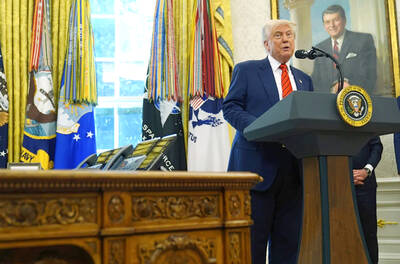The 193 UN member countries agreed on Saturday to cut the global body’s budget for only the second time in the past 50 years following a long night of negotiations.
An accord struck at dawn on Saturday saw the 2012-2013 budget set at US$5.15 billion, down from US$5.41 billion in 2010-2011.
The US and crisis-stricken European countries had fought for cuts, while developing countries had demanded spending be maintained.
“All budget years are tough, but this year was especially difficult,” UN Secretary-General Ban Ki-moon said, welcoming the accord and vowing more cuts in the coming months. “Governments and people everywhere are struggling.”
US negotiator Joseph Torsella called the budget a “historic agreement,” though he acknowledged it had taken “difficult negotiations.”
Nearly every day last week talks have finished at about 5am.
This accord “is the first time since 1998 — and only the second time in the last 50 years — that the UN regular budget has declined in comparison to the previous budget’s actual expenses,” Torsella said.
He called it a “budget for a strengthened, more efficient and more effective United Nations that saves the American taxpayers millions of dollars and sets the United Nations on the path of real fiscal discipline and continued reform.”
The US has taken a tough line on UN spending, with Torsella this year railing at increased salary allowances for UN staff.
Ban acknowledged that the global body has to “cut fat.”
It has already cut posts and contracted out services in many departments at the New York headquarters.
“One year from now, I will return to you with greater cost savings,” the UN chief vowed in a speech to the delegates who struck the accord.

A new online voting system aimed at boosting turnout among the Philippines’ millions of overseas workers ahead of Monday’s mid-term elections has been marked by confusion and fears of disenfranchisement. Thousands of overseas Filipino workers have already cast their ballots in the race dominated by a bitter feud between President Ferdinand Marcos Jr and his impeached vice president, Sara Duterte. While official turnout figures are not yet publicly available, data from the Philippine Commission on Elections (COMELEC) showed that at least 134,000 of the 1.22 million registered overseas voters have signed up for the new online system, which opened on April 13. However,

ALLIES: Calling Putin his ‘old friend,’ Xi said Beijing stood alongside Russia ‘in the face of the international counter-current of unilateralism and hegemonic bullying’ Chinese President Xi Jinping (習近平) yesterday was in Moscow for a state visit ahead of the Kremlin’s grand Victory Day celebrations, as Ukraine accused Russia’s army of launching air strikes just hours into a supposed truce. More than 20 foreign leaders were in Russia to attend a vast military parade today marking 80 years since the defeat of Nazi Germany in World War II, taking place three years into Russia’s offensive in Ukraine. Putin ordered troops into Ukraine in February 2022 and has marshaled the memory of Soviet victory against Nazi Germany to justify his campaign and rally society behind the offensive,

CONFLICTING REPORTS: Beijing said it was ‘not familiar with the matter’ when asked if Chinese jets were used in the conflict, after Pakistan’s foreign minister said they were The Pakistan Army yesterday said it shot down 25 Indian drones, a day after the worst violence between the nuclear-armed rivals in two decades. Pakistani Prime Minister Shehbaz Sharif vowed to retaliate after India launched deadly missile strikes on Wednesday morning, escalating days of gunfire along their border. At least 45 deaths were reported from both sides following Wednesday’s violence, including children. Pakistan’s military said in a statement yesterday that it had “so far shot down 25 Israeli-made Harop drones” at multiple location across the country. “Last night, India showed another act of aggression by sending drones to multiple locations,” Pakistan military spokesman Ahmed

US President Donald Trump on Wednesday said that he would make a decision about how the US government would refer to the body of water commonly known as the Persian Gulf when he visits Arab states next week. Trump told reporters at the White House that he expects his hosts in Saudi Arabia, Qatar and the United Arab Emirates will ask him about the US officially calling the waterway the Arabian Gulf or Gulf of Arabia. “They’re going to ask me about that when I get there, and I’ll have to make a decision,” Trump said. “I don’t want to hurt anybody’s